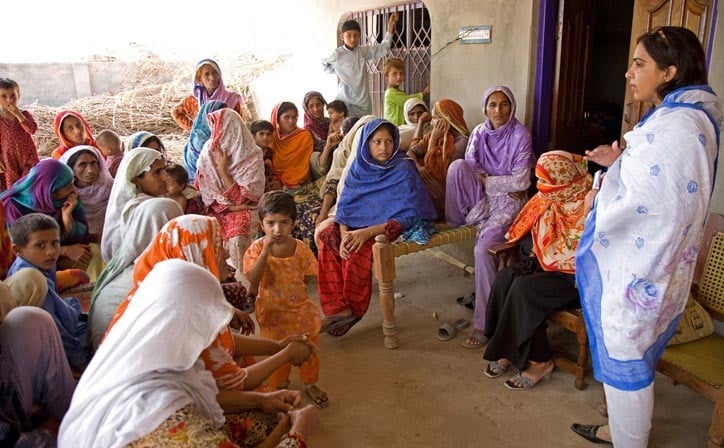
Rising population poses a serious threat to Pakistan’s progress. Here are a few suggestions by experts to stem the crisis

The biggest issues facing Pakistan are the booming population growth and the lack of awareness across the board regarding how big a threat this poses to the country’s progress. Simply put, the country has too many people and not matching resources in the spheres of food, health, education, and employment systems. Conferences are held and experts join their heads in exasperation to think of policies and projects that can manage this unbridled growth. Yet, the most basic of problems is often overlooked -- raising awareness.
If enough efforts are not made to slow down Pakistan’s population growth rate, the population will likely increase from the current 189 million people to 310 million by 2050 (UN DESA, 2015). But this is a conservative estimate. According to President Population Association of Pakistan and Chairman Punjab Higher Education Commission Dr Nizamuddin, the country’s population would cross the 395 million mark by 2047. He said this at the recently held Eighteenth Annual Population Research Conference, Population Growth and Investing in Human Resource Development, in collaboration with Government College University Lahore. With just three years left to achieve its FP 2020 targets, Pakistan’s high growth rate of 2.4 per cent depicted in Population Census of 2017 asks for serious efforts.
Speakers at the conference gave different and relevant solutions to how the challenge can be met. Dr Aziz Rab of Greenstar Marketing emphasised on a number of ideas, all aimed at raising general awareness among people regarding family planning, like a toll free number where people can get guidance regarding FP, as well as free air time for the purpose. However, all of this would need political will and support from the government.
Dr Attiya Inayatullah, Chairperson Rahnuma Group of Pakistan, pressed upon the need for public-private partnerships to achieve the desired targets. She expressed the need to bring the private sector on board in all FP efforts, as well as leveraging men to become allies in this endeavour. Stalwarts of the field like Dr Mehtab S. Karim, Executive Director, Centre for Studies in Population & Health, Dr. Zeba A. Sathar, Country Director, Population Council, and Dr. Farid Midhet, Vice President, Population Association of Pakistan & Country Director, Jhpiego Pakistan, participated in the conference.
A panel discussion on Pakistan’s 6th population census results, organised by Jhpiego and the Population Association of Pakistan, had experts debating the methodology of the population census 2017. Journalist Zofeen Ebrahim who was invited as a panelist at the session, said that now that Pakistan has a fair idea of the numbers "we need to focus on planning for the people in earnest instead of quibbling over the methodology of the census".
As Dr Inayatullah pointed out, Pakistan has the know-how and can achieve the targets. What it needs right now is a reality check, she said. "There are two gaps: Implementation is key for which we must get down to the grass roots. And secondly, where do we find a political leader who will speak out boldly in an upfront manner about this?"
A possible solution
While moots like the aforementioned conference give the much needed impetus to the issue at the top of the pyramid, doctors working at grassroots level like obstetrician Dr Halima Yasmeen at the Jinnah Postgraduate Medical Centre (JPMC) Karachi, feel that growth rate cannot be slowed down till awareness is raised. For this, dedicated counselors who can talk to women and convince them to use contraceptives can play a core role.
"It is an evidence-based fact that introducing a cadre of FP counselors shows better results when it comes to use of contraceptives. These counselors should be there at hospitals 24/7, just like nursing and janitorial staff is there round the clock. And their job should be only to talk to people," she said, emphasising the importance of convincing people to use contraceptives.
"Our doctors are fulfilling their own dreams, and are on autopilot mode. What they are not doing is fulfilling the needs of this country as a whole," said Dr Azra Ahsan, gynaecologist and consultant at the National Committee for Maternal and Neonatal Health (NCMNH). Dr Ahsan, while talking to The News on Sunday, expressed that the key to solving this problem lies in sensitising healthcare practitioners. "Every healthcare provider should know about providing family planning (FP) services. But they are not taught how to do it properly even in medical colleges. They don’t even know how to manage post-partum hemorrhage, because there is no glamour in this kind of healthcare service," she says.
With mobility restrictions and traditional barriers, women don’t readily come to hospitals and clinics. However, the rates of women opting for deliveries in hospitals or healthcare units has gone up considerably, and this allows a great opportunity to convince them for post-partum contraception. "Most women do not come back for follow ups, which means that they will not get contraception-related advice in time," says Dr Ahsan, commenting on golden opportunities that keep slipping through the net.
A project of NCMNH involved stationing two to three dedicated FP counselors in selected hospitals in Karachi, and this strategic placement multiplied the number of women opting for contraceptives like Intra-Uterine Devices (IUDs). "The day the counselors didn’t come, we saw that no women opted for contraceptives," says Dr Ahsan.